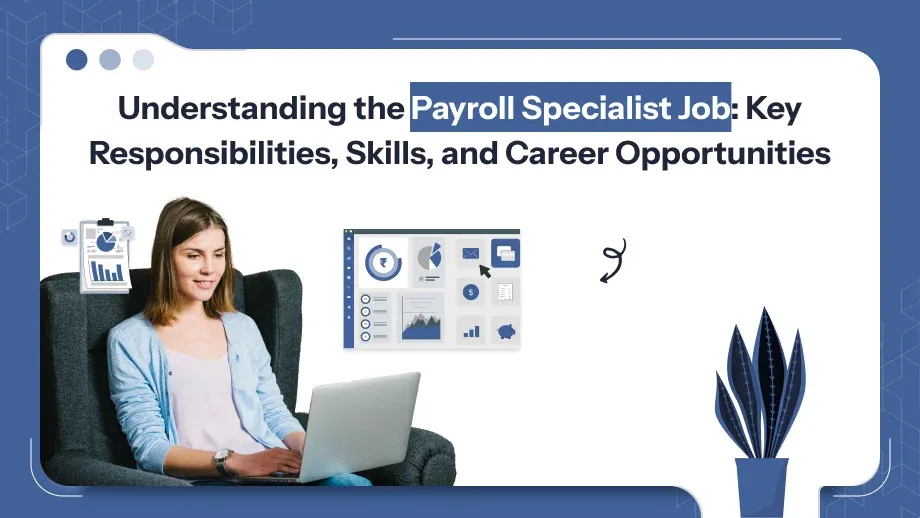
One of the most essential jobs in every company is the position of payroll specialist. Payroll specialists job manage an array of responsibilities linked to payroll processing, legal compliance, and recordkeeping, with an important part in assuring employees get timely and precise compensation.
Payroll professionals are essential to ensuring financial stability and increasing employee happiness for companies of all sizes. The position description of a payroll specialist job, key indicators of success, and the growing need for payroll specialist positions across industries will all be covered in this extensive guide.
What is payroll specialist job?
A Payroll Specialist job is one of the many professions that are involved with handling and processing employee compensation within an organization. The main work of such a specialist includes calculating employee salaries, wages, bonuses, and deductions, which should be free of any law defaults.
They handle employee benefits, generate payroll reports, and maintain accurate payroll records. Payroll specialists also address employee inquiries about pay discrepancies and ensure timely tax filings.
This role requires good attention to detail, knowledge of tax and labor laws, and proficiency in payroll software. In order to compensate workers on time and precisely to increase company effectiveness, payroll specialists is essential.
Job payroll specialist have to be meticulous, organized, and conversant about tax and labor laws. Their activities can vary form doing basic pay tasks in smaller businesses to handling complex payroll systems in bigger companies.
Job Description of Payroll Specialist
A payroll specialist’s job description covers an extensive list of responsibilities, all of them are required for accurate and efficient payroll processing. Let’s examine a few of the key obligations;
Processing Employee Payments
Accurately processing employee wages is a payroll specialist’s primary duty. This involves figuring up employee salaries, handling commissions, bonuses, and compensation for overtime, as well as ensuring sure that any appropriate deductions—like insurance, taxes, and retirement contributions are recorded.
For salaried workers, it frequently entails making certain that their compensation is determined in accordance with their employment contract, accounting for any bonuses, commissions, or compensation for overtime work..
Managing Payroll Records
The duty of keeping proper payroll documents for each worker falls on a payroll specialist. This involves maintaining records of worker hours, pay, overtime, paid time off, and withholding of taxes data. For the purpose of future audits, returns for taxes, & compliance, these records must be updated and easily accessible.
Ensuring compliance to tax laws and labor laws
Payroll staff must be kept up to date on modifications to labor laws, tax rules, and compensation demands so as to maintain compliance with the law. In many countries, the payroll division is liable for handling or calculating tax withholdings, such as payroll tax, social security payments, and unemployment taxes. Payroll specialists are also in charge of ensuring that the business complies with labor laws, including those concerning extra hours, salaries, and paid days off.
Handling Benefits Administration
Payroll specialists could be in charge of benefits for workers like health insurance, retirement applications, monetary time off, and additional perks in addition to salary and wages. They guarantee that staff members receive the benefits to which they have a right and that their benefit reductions are processed correctly.
Interested in Payroll Specialist job?
Learn more about the skills, responsibilities, and career opportunities!
Generating Reports
The task of generating and assembling payroll reports for management falls to payroll specialists. Detailed descriptions of employee revenue, tax obligations, deductions, and payments for benefit plans frequently appear in these reports. Budgeting, auditing, and upholding financial transparency all depend on these documents.
Addressing Employee Inquiries
Workers often have inquiries about their compensation, benefits, or deductions. These questions need to be handled quickly by a payroll specialist. This calls for outstanding communication skills as well as an ability to handle payroll issues or concerns precisely and attentively.
Payroll Tax Filing
Making sure payroll taxes are submitted on time constitutes one of a payroll specialist’s main duties. This entails paying tax to the proper government departments and completing out the required documentation, including income tax returns, Td (Tax Deducted at Sources) forms, as well as additional regulatory filings.
Auditing and Reconciliation
By conducting regular checks and checks, workers in payroll are also responsible for ensuring the accuracy of payroll data. To identify and correct discrepancies, this involves contrasting payroll information with bank statements and other financial documents.
Confidentiality and Security
Payroll specialists must conform to privacy regulations and maintain strict secrecy because of the delicate nature of the data they manage. Preventing identity theft and fraud requires that employee payroll information be secure.
Skills Required for a Payroll Specialist Job
It takes a combination of technical, analytical, and soft abilities to be a good payroll specialist. Let’s review the fundamental skills required for this position in greater detail:
Attention to Detail
Accuracy is paramount in payroll processing. Even small mistakes can lead to incorrect pay, which can result in employee dissatisfaction and compliance issues.To make sure that salaries, expenses, and fringe benefits are computed correctly, payroll workers have to manage payroll data with great attention to precision.
Knowledge of Tax Laws and Labor Regulations
Payroll individuals must have a solid understanding of local labor regulations and tax legislation. To keep the business in compliance, these professionals need to be informed about changes in tax rates, statutory deductions, and employee benefits laws. This entails being aware of the intricacies of several local benefits, such as worker state insurance (ESI), employee provident fund (the EPF), and taxation of income.
Analytical Skills
To find deviations, spot structures, and fix problems, payroll specialists needs to be able to evaluate payroll data. They should be competent at reviewing financial data, doing audits, and generating reporting utilizing spreadsheet and programs.
Proficiency in Payroll Software
Nowadays, specialist payroll software is employed to automate the vast majority of payroll procedures.Employees payroll processing system must be competent with these tools in order to speed up processing. The most commonly utilized payroll software programs are the accounting firm Int Oracle, SAP, and Hp.
Time Management
Payroll individuals need to have extraordinary abilities to manage time due to the nature of their work. They have accountability for ensuring all of the payroll-related duties, such as collecting paychecks, filing fees, and writing reports, are finished on schedule. Complete adherence to schedules is needed to prevent staff pay problems and problems with compliance with regulations.
Problem-Solving Abilities
Payroll specialists frequently deal with problems or discrepancies related to employee compensation. It takes excellent problem-solving skills to quickly find and fix payroll mistakes or handle staff complaints over their monetary compensation.
Communication Skills
Payroll experts must be able to interact clearly and competently with management, human resources departments, or workers. They have to be able to handle issues and provide comprehensive explanations of payroll procedures. Effective interpersonal abilities are required to address staff concerns over earnings disparities.
Confidentiality
Since they deal with sensitive financial data, payroll specialists must maintain a high standard of security and confidentiality. Since they have access to their employees’ financial and personal data, payroll specialists have to be trusted.
Types of Payroll Specialist Jobs
Payroll specialist job description is an extensive subject, and various degrees of knowledge and competence make them appropriate to distinct pay specialist professions. The main classes of roles are following:
Entry-Level Payroll Specialist Jobs
Typical payment duties done by an entry-level payroll expert include data entry, payroll record maintenance, and basic payroll administration assistance. For someone just starting out in the pay industry, this role is perfect because it offer the chance to gain the skills needed for higher-level positions.
Senior Payroll Specialist Jobs
With bigger experience, a senior payroll skilled takes on more duties, like managing payroll for a bigger staff, ensuring that tax regulations are followed, and resolving complicated payroll issues. They might also be in charge of teaching new hires and managing payroll software.
Payroll Manager Jobs
A payroll manager is accountable for overseeing a team of payroll specialists and handling the entire payroll process. The duties of this position includes creating reports for executives, verifying that all payroll regulations are obeyed, and putting payroll procedures into action. Payroll administrators typically work in tandem with human resources and finance staff to streamline payment operations.
Payroll Administrator Jobs
Payroll administrators oversee the day-to-day operations of payroll processing. In addition to ensure that employees are paid on time and done correctly, they are responsible for maintaining personnel records. Pay directors may also be responsible for of staff inquiries and benefits processing.
Why Payroll Specialist Jobs are in High Demand?
The demand for payroll specialist jobs is growing steadily, driven by several factors:
Increased Regulatory Complexity
As taxation and employment regulations become increasingly complicated, businesses demand payroll specialists with legal experience. Due to the increasing amount of needed exclusions and modifications to the tax code, companies need experienced payroll specialists for making sure they stay compliant.
Growth in Outsourcing Payroll Services
Several businesses are working with outside vendors to handle their payroll processing so as to save both money and time. As a result, payroll administrators who handle payroll processing for numerous customers are given greater job possibilities in companies that outsource.
Technological Advancements
The use of computerized payroll software has culminated in changes to the way payroll professionals operate. As technology expands, payroll specialist job will be required to oversee the integration of payroll management software with other organizational systems and ensure that systems are set up properly.
Globalization of the Workforce
The role of payroll professionals gets increasingly complex as companies grow globally and hire staff members from various locations. Payroll managers oversee a variety of taxes, insurance policies, including labor laws for individuals across multiple countries.
Conclusion
A payroll specialist job is essential to any the company’s capacity to maintain both financial stability and employee satisfaction. Payroll specialist provide a crucial function that calls for both technical know-how and people skills, from payroll processing and keeping data to ensuring tax compliance and answering employee questions.
The demand for payroll specialist jobs is predicted to be high as companies expand as legal requirements change, offering people in this industry a wide range of employment options. Understanding the job descriptions payroll specialists have the abilities needed to be successful will help you succeed in this crucial position, regardless of if you’re thinking about a career in pay or are interested in expanding your horizons.









